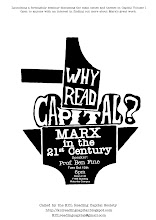Nicholas Beech, a PhD student from University College London, will introduce a discussion on:
‘The Division of Labour and Manufacture'
Tuesday April 13th (NOTE New date! - Giving everyone extra time to read this section)
6pm
F-WB 2.80
Waterloo Campus KCL
"That co-operation which is based on division of labour, assumes its typical form in manufacture, and is the prevalent characteristic form of the capitalist process of production throughout the manufacturing period properly so called. That period, roughly speaking, extends from the middle of the 16th to the last third of the 18th century."
"The organisation of manufacture has two fundamental forms which, in spite of occasional blending, are essentially different in kind, and, moreover, play very distinct parts in the subsequent transformation of manufacture into modern industry carried on by machinery. This double character arises from the nature of the article produced. This article either results from the mere mechanical fitting together of partial products made independently, or owes its completed shape to a series of connected processes and manipulations."
"An increased number of labourers under the control of one capitalist is the natural starting-point, as well of co-operation generally, as of manufacture in particular. But the division of labour in manufacture makes this increase in the number of workmen a technical necessity."
"The knowledge, the judgement, and the will, which, though in ever so small a degree, are practised by the independent peasant or handicraftsman, in the same way as the savage makes the whole art of war consist in the exercise of his personal cunning these faculties are now required only for the workshop as a whole. Intelligence in production expands in one direction, because it vanishes in many others. What is lost by the detail labourers, is concentrated in the capital that employs them."
N.B. We will be reading chapters 14 for this session.
Facebook event at:
http://www.facebook.com/group.php?gid=49539959005&ref=ts#!/event.php?eid=375361080676&ref=mf
Wednesday, 17 March 2010
Wednesday, 3 March 2010
Surplus-Value, Relative Surplus-Value & Co-operation
Lorenzo Fusaro, Jonny Jones (deputy-editor of International Socialism Journal), and John Cooper of the Reading Capital group will introduce a discussion on chapters 11, 12 and 13 respectively:
‘Surplus-Value, Relative Surplus-Value & Co-operation’.
Tuesday March 9th
6pm
F-WB 2.80 Waterloo Campus KCL
"At first, capital subordinates labour on the basis of the technical conditions in which it historically finds it. It does not, therefore, change immediately the mode of production. The production of surplus-value — in the form hitherto considered by us — by means of simple extension of the working day, proved, therefore, to be independent of any change in the mode of production itself. It was not less active in the oldfashioned bakeries than in the modern cotton factories."
"The object of all development of the productiveness of labour, within the limits of capitalist production, is to shorten that part of the working-day, during which the workman must labour for his own benefit, and by that very shortening, to lengthen the other part of the day, during which he is at liberty to work gratis for the capitalist."
"...the sum total of the mechanical forces exerted by isolated workmen differs from the social force that is developed, when many hands take part simultaneously in one and the same undivided operation... Not only have we here an increase in the productive power of the individual, by means of co-operation, but the creation of a new power, namely, the collective power of masses."
"Just as the social productive power of labour that is developed by co-operation, appears to be the productive power of capital, so co-operation itself, contrasted with the process of production carried on by isolated independent labourers, or even by small employers, appears to be a specific form of the capitalist process of production."
N.B. We will be reading chapters 11, 12 and 13 for this session.
‘Surplus-Value, Relative Surplus-Value & Co-operation’.
Tuesday March 9th
6pm
F-WB 2.80 Waterloo Campus KCL
"At first, capital subordinates labour on the basis of the technical conditions in which it historically finds it. It does not, therefore, change immediately the mode of production. The production of surplus-value — in the form hitherto considered by us — by means of simple extension of the working day, proved, therefore, to be independent of any change in the mode of production itself. It was not less active in the oldfashioned bakeries than in the modern cotton factories."
"The object of all development of the productiveness of labour, within the limits of capitalist production, is to shorten that part of the working-day, during which the workman must labour for his own benefit, and by that very shortening, to lengthen the other part of the day, during which he is at liberty to work gratis for the capitalist."
"...the sum total of the mechanical forces exerted by isolated workmen differs from the social force that is developed, when many hands take part simultaneously in one and the same undivided operation... Not only have we here an increase in the productive power of the individual, by means of co-operation, but the creation of a new power, namely, the collective power of masses."
"Just as the social productive power of labour that is developed by co-operation, appears to be the productive power of capital, so co-operation itself, contrasted with the process of production carried on by isolated independent labourers, or even by small employers, appears to be a specific form of the capitalist process of production."
N.B. We will be reading chapters 11, 12 and 13 for this session.
Subscribe to:
Comments (Atom)
